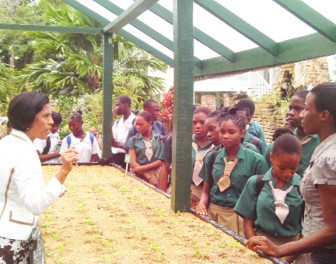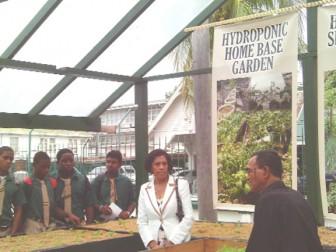Fulfilling a promise, First Lady Deolatchmee Ramotar yesterday launched the ‘Garden for the Children of Guyana Initiative’ that she hopes will foster healthy eating habits among young people and allow the inner-city youths gardening experiences of their rural counterparts.
The ‘First Garden’ was yesterday launched on State House Lawns to observe International Children’s Day. An area of the lawn has been apportioned for gardening project, where children from three pilot secondary schools, Christ Church, Kingston and St John’s, will join the First Lady in gardening.
At yesterday’s launch, which included a tour of the project, Mrs Ramotar said, “I believe that it is fitting to commemorate International Children’s Day with an initiative that would expose our children and stimulate their interest from an early age, in botany and agriculture.” She used personal experience, noting how fascinated her own children were when they saw seeds she had set go through the germination process. This simple experience, she said, was responsible for their lifelong interest in the sciences. She charged parents, teachers, guardians and leaders to equip their children with gardening knowledge as over time the results would be beneficial.

“We must continue this tradition. Encouraging our children to cultivate small kitchen gardens at home and at school is one good way of doing this while allowing them to enjoy recreational, heath and educational benefits,” the First Lady said.
She stressed that one does not need a whole lot of space to begin gardening and whatever space is available it could be used to plant items that could save the planter much needed cash at the market. “No matter how small is the available space in your yard you can develop a small patch as kitchen garden…,” she said, adding that she hopes her garden would be used as inspiration to motivate the populace into getting back to traditional gardening.
On hand to give support to his wife was President Donald Ramotar, who admitted that while he is not “not big” into gardening, and it is his wife who “has come from a agricultural area and has a big passion” for it, noted the value of gardening and also urged all to get into planting.
“For very a long time many people looked down on agriculture as a low level type of work and this is why I am happy my wife has taken this initiative,” the President said. “Because I think we need to bring dignity to every form of work people do… Agriculture, in particular, which has such a big role to play in the development of our country,” he said. He reiterated that agriculture can play a pivotal part in Guyana’s economic growth, given that the country has the available land and soil types conducive to producing a wide range of crops.

Ramotar stated that he was pleased that particularly urban children would be now given the opportunity to experience the benefits of gardening as village children.
Candace Hutson, a Fourth Form Science student at the Christ Church Secondary School told Stabroek News that she was elated to be part of the pilot group who would garden at State House. “I am excited and look forward to gardening… I am particularly happy to know about ‘raised bed’ gardening as we don’t have much yard space so I see this as being most beneficial to my family,” she said.
The plot, located on the southern side of State House will grow plants under three different methods. There will be traditional gardening, where earth will be forked and mixed with manure, as is commonly practiced in Guyana, since it is inexpensive and accessible. The second method is hydroponics, which is farming with or without soil content and is said to teach the students to grow produce in areas where the soil is not conducive to traditional farming. The third method, ‘raised bed’ gardening, was described as a type of planting that would be most beneficial to urban dwellers. It is intended to demonstrate to students that gardening can be done on elevated concrete sections while at the same time allowing plants to grow closer, conserving on water and providing improved aeration of the roots.
Students from the three schools will, in the first phase of the project, work in rotation as they plant vegetables, which they will sell to the public to keep the process going. Into the next phase, they will grow crops commonly imported, such as large bell peppers, broccoli, cauliflower, and chives, among others.





